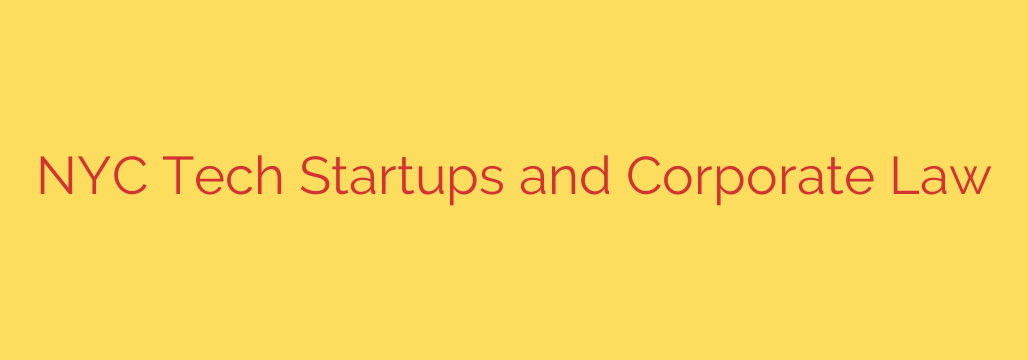
Navigating the Legal Maze: A Founder’s Guide to Corporate Law in the NYC Tech Scene
New York City’s tech ecosystem is a dynamic and fiercely competitive arena. For every groundbreaking idea that takes flight, there’s a complex web of legal requirements that can either support its ascent or send it crashing down. For startup founders, understanding the essentials of corporate law isn’t just a box to check—it’s a fundamental pillar of sustainable growth and success.
Navigating this landscape without a clear legal roadmap is one of the most significant risks a new venture can take. From the moment you formalize your partnership to your first major funding round, every decision has legal implications. This guide breaks down the critical legal considerations every NYC tech startup founder needs to master.
Laying the Groundwork: Entity Formation
One of the first and most critical decisions you’ll make is choosing the right legal structure for your company. While options like a Sole Proprietorship or LLC exist, most tech startups planning to seek venture capital investment opt for a different path.
For most tech startups, the Delaware C Corporation is the gold standard. This structure is preferred by investors for its flexibility in issuing stock, creating different classes of shares (for founders versus investors), and its well-established body of corporate law.
- Why a C-Corp? Venture capitalists are comfortable with this structure and their investment documents are designed for it. It allows for the easy implementation of stock option plans to attract top talent.
- Why Delaware? The state has a highly respected, business-friendly court system (the Court of Chancery) specifically dedicated to handling corporate disputes efficiently and predictably.
Actionable Tip: Don’t use a cheap online service to form your company without understanding the consequences. Consulting with a startup-focused lawyer to choose and correctly form your entity is a crucial first investment that prevents costly restructuring down the line.
Your Most Valuable Asset: Securing Intellectual Property (IP)
In the tech world, your code, brand, and proprietary processes are often the core of your company’s value. Protecting these assets from day one is non-negotiable.
Intellectual Property for a tech startup typically includes:
- Patents: To protect novel inventions and processes.
- Trademarks: To protect your company name, logo, and taglines.
- Copyrights: To protect your software code, website content, and marketing materials.
- Trade Secrets: To protect confidential information like algorithms, customer lists, and business strategies.
A critical mistake many founders make is failing to secure IP ownership from everyone who contributes to the business. This includes co-founders, employees, and freelance contractors. Without a formal, signed agreement, a developer who wrote a key piece of your code could later claim ownership, creating a catastrophic legal problem.
Actionable Tip: Implement Confidential Information and Invention Assignment Agreements (CIIAAs) for every single person who works for or with your company, including founders. This ensures that any IP created for the business is legally owned by the business.
Fueling Growth: Fundraising and Securities Law
Raising capital is a landmark moment for any startup, but it’s also a process governed by strict federal and state securities laws. Whether you’re accepting a small check from an angel investor or closing a multi-million dollar Series A round, you are selling securities (stock) in your company.
Failing to comply with securities regulations can lead to severe penalties, including the requirement to return all funds raised. Key documents in this stage, such as term sheets, convertible notes, SAFE notes, and stock purchase agreements, are legally binding and complex.
Every dollar you raise comes with significant legal obligations. Trying to manage a funding round using generic templates found online is incredibly risky. Each deal has unique nuances that require professional oversight to protect both the company and its founders.
Actionable Tip: Never sign a term sheet without having it reviewed by experienced legal counsel. Your lawyer will help you understand critical terms like valuation, liquidation preferences, and anti-dilution provisions that will impact your ownership and control for years to come.
Building Your Team: Employment Law and Equity Compensation
Hiring your first employees is exciting, but it also opens your company up to a host of employment laws, which are particularly complex in New York City.
Key legal considerations when hiring include:
- Employee vs. Contractor Classification: Misclassifying an employee as an independent contractor to save on taxes and benefits can result in massive fines and back-pay requirements.
- Offer Letters and Employment Agreements: These documents should clearly outline job responsibilities, compensation, at-will employment status, and confidentiality obligations.
- Equity Compensation: Offering stock options is a powerful tool for attracting top talent. However, a formal Stock Option Plan must be properly established and managed, including clear vesting schedules, to be legally compliant and effective.
Mishandling equity or misclassifying workers can create massive legal and financial liabilities that can scare off future investors.
Actionable Tip: Establish a clear and legally vetted process for hiring and onboarding. Work with a lawyer to create your standard employment agreements and a compliant stock option plan before you make your first hire.
Building a successful tech company in NYC requires more than just a brilliant idea and relentless hustle. It demands a proactive and intelligent approach to corporate law. By building your venture on a solid legal foundation, you protect your vision, attract smart capital, and position your company for long-term, scalable success.
Source: https://collabnix.com/how-corporate-law-impacts-tech-startups-in-new-york-city/








